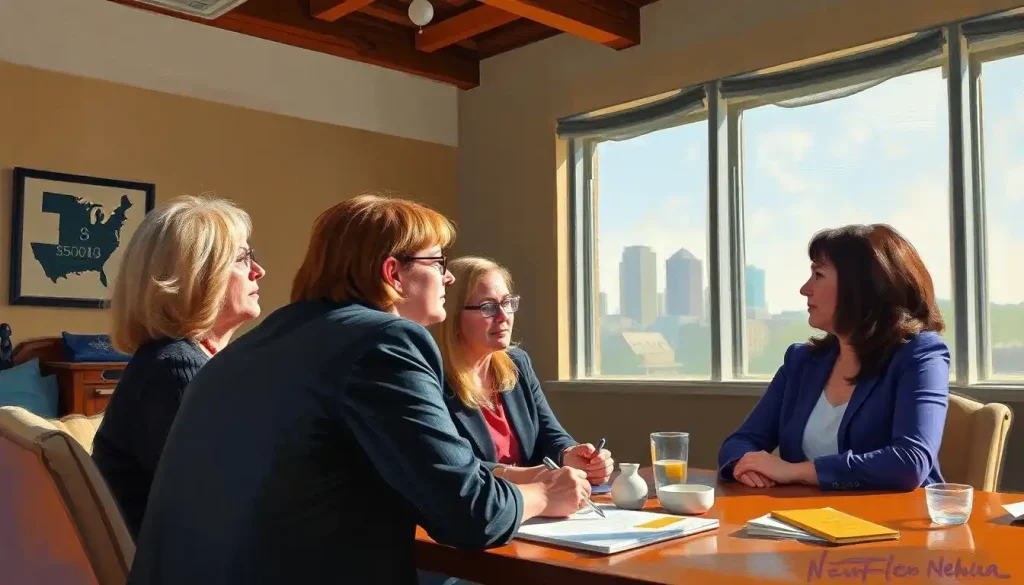Behind every inherited property lies a potential goldmine for savvy real estate investors who know how to navigate the delicate balance between opportunity and empathy. The world of probate investing is a unique niche within the real estate market, offering both challenges and rewards for those willing to venture into this often overlooked territory. It’s a realm where patience, understanding, and business acumen intersect, creating opportunities for investors to acquire properties at potentially below-market prices while helping families navigate a difficult time in their lives.
Unraveling the Probate Process: A Gateway to Unique Investment Opportunities
Probate investing, at its core, involves purchasing properties that are part of a deceased person’s estate. This process unfolds when someone passes away, leaving behind assets that need to be distributed according to their will or, in the absence of a will, state laws. The probate court oversees this distribution, ensuring that all debts are settled and the remaining assets are transferred to the rightful heirs.
What makes probate properties particularly intriguing for investors is the unique set of circumstances surrounding their sale. Often, heirs may be eager to liquidate these assets quickly, either due to financial pressures or the emotional burden of managing a loved one’s property. This urgency can create opportunities for investors to acquire properties at favorable prices, sometimes significantly below market value.
The probate process itself can be complex and time-consuming, typically involving several key steps. Initially, the court appoints an executor (if named in the will) or an administrator (if there’s no will) to manage the estate. This individual is responsible for inventorying assets, paying debts, and ultimately distributing the remaining property to heirs.
During this period, which can last anywhere from a few months to over a year, depending on the complexity of the estate and local laws, properties may become available for purchase. This is where savvy investors can step in, armed with knowledge and a compassionate approach.
The Allure of Probate Properties: Unearthing Hidden Gems
One of the most compelling aspects of probate investing is the potential for acquiring properties at below-market prices. This advantage stems from various factors, including the executor’s desire to settle the estate quickly, the property’s condition, or simply a lack of awareness of the property’s true market value.
Moreover, probate properties often face less competition compared to traditional real estate investments. Many investors shy away from probate deals due to their complexity or the emotional nature of the transactions. This reduced competition can be a significant advantage for those willing to navigate the probate landscape.
Another enticing aspect is the opportunity to acquire properties in desirable locations. Many probate properties are long-held family homes in established neighborhoods, offering investors access to areas that might otherwise be difficult to break into. These properties often come with inherent value due to their location, even if they require some updating or renovation.
The motivated nature of many sellers in probate situations can also lead to more flexible negotiations. Executors and heirs may be more open to creative deal structures or quicker closings, which can be advantageous for investors looking to maximize their returns.
Navigating the Emotional Terrain: Challenges in Probate Investing
While the potential rewards of probate investing are significant, it’s crucial to acknowledge and prepare for the unique challenges this niche presents. Perhaps the most delicate aspect is dealing with grieving families. Investors must approach these situations with empathy and sensitivity, recognizing that they’re not just dealing with a property, but with people experiencing a significant loss.
The legal complexities of probate can also be daunting. Each state has its own probate laws and procedures, and navigating these can be time-consuming and confusing for the uninitiated. Working closely with probate attorneys and understanding the local legal landscape is crucial for success in this field.
Property condition is another potential hurdle. Many probate properties have been occupied by elderly individuals who may not have kept up with maintenance or modern upgrades. Investors need to be prepared for properties that might require significant renovation or updating, factoring these costs into their investment calculations.
Patience is a virtue in probate investing. The process can be lengthy, with court approvals and multiple parties involved potentially extending timelines beyond what’s typical in traditional real estate transactions. Investors need to be prepared for extended waiting periods and the possibility of deals falling through due to legal complications or changing family dynamics.
Crafting Success in Probate Investing: Strategies for the Savvy Investor
Success in probate investing requires a multifaceted approach, combining legal knowledge, interpersonal skills, and real estate acumen. One of the most effective strategies is building relationships with probate attorneys and court officials. These connections can provide invaluable insights into upcoming probate cases and help investors navigate the legal intricacies more smoothly.
Researching probate listings and public records is another crucial step. Many counties publish probate filings online, allowing investors to identify potential opportunities early in the process. This proactive approach can give investors a head start in approaching executors or administrators.
When reaching out to executors and heirs, a professional and empathetic approach is paramount. It’s essential to remember that you’re dealing with individuals who may be going through a difficult time. Clear, compassionate communication and a willingness to work with their needs can set you apart from other investors and increase your chances of success.
Thorough due diligence is critical in probate investing, perhaps even more so than in traditional real estate deals. This includes not only assessing the property’s condition and value but also understanding any potential legal issues or claims against the estate that could complicate the transaction.
Structuring offers in probate situations requires a delicate balance. While executors and heirs may be motivated to sell quickly, they also have a fiduciary duty to the estate to obtain fair market value. Investors should be prepared to justify their offers and potentially navigate court approval processes for sales below a certain threshold of the appraised value.
Ethical Considerations: Balancing Profit and Compassion
Navigating the ethical landscape of probate investing is crucial for long-term success and personal integrity. It’s essential to approach these investments with a commitment to fair dealing and transparency. This means being honest about your intentions as an investor and providing clear, accurate information about the property’s value and potential.
Understanding and respecting state-specific probate laws is not just a legal necessity but an ethical imperative. Each state has its own regulations governing probate sales, and investors must ensure they’re operating within these guidelines. This might involve working closely with licensed real estate professionals or legal experts who specialize in probate cases.
When dealing with bereaved families, it’s important to strike a balance between pursuing a business opportunity and showing genuine empathy. This might mean being flexible with timelines, offering assistance with property cleanouts, or simply being a patient and understanding presence throughout the process.
Working collaboratively with probate attorneys and estate representatives can help ensure that all parties’ interests are respected. These professionals can provide valuable guidance on navigating the legal aspects of the transaction and can help mediate any potential conflicts that arise.
Ensuring clear title and proper documentation is not just a matter of protecting your investment; it’s about respecting the legal process and the rights of all parties involved. This might involve additional title searches or legal consultations to address any potential issues before they become problems.
Compliance with probate court procedures is non-negotiable. This includes adhering to any required waiting periods, obtaining necessary approvals, and ensuring that all sales are conducted in a manner that the court deems fair and transparent.
Expanding Your Real Estate Portfolio: The Role of Probate Investing
As investors look to diversify their real estate portfolios, probate properties offer a unique avenue for expansion. Unlike traditional investments or even other niche markets like senior living facilities, probate investing requires a specific skill set and approach that can set savvy investors apart from the competition.
One of the key advantages of incorporating probate investments into your portfolio is the potential for reduced competition. While many investors flock to popular markets or well-known investment strategies, probate properties often fly under the radar. This can be particularly advantageous in hot real estate markets where finding good deals has become increasingly challenging.
Moreover, probate investing can offer access to properties in established neighborhoods that might otherwise be difficult to enter. Many probate properties are long-held family homes in desirable locations, offering investors the chance to acquire assets in areas with strong appreciation potential.
The nature of probate sales also aligns well with value-add investment strategies. Many of these properties may need updates or renovations, providing opportunities for investors to significantly increase the property’s value through strategic improvements. This can be particularly lucrative in markets where updated homes command premium prices.
Navigating Market Fluctuations: Probate Investing as a Stabilizing Force
In times of market uncertainty or economic downturns, probate investing can serve as a stabilizing force in an investor’s portfolio. The motivations behind probate sales are often disconnected from broader market trends, potentially providing a steady stream of opportunities even when traditional real estate markets slow down.
This aspect of probate investing shares some similarities with other counter-cyclical investment strategies, such as bankruptcy investing. Both approaches capitalize on situations where sellers may be motivated by factors other than maximizing profit, creating opportunities for savvy investors to acquire assets at favorable prices.
However, it’s important to note that probate investing requires a different approach than bankruptcy or distressed property investing. While all these strategies involve dealing with motivated sellers, probate investing demands a higher degree of emotional intelligence and interpersonal skills due to the sensitive nature of the transactions.
Building a Network: The Power of Connections in Probate Investing
Success in probate investing often hinges on building a strong network of professionals and contacts within the probate ecosystem. This network might include probate attorneys, court clerks, real estate agents specializing in probate sales, and even other investors focusing on this niche.
Developing these relationships can provide invaluable benefits, from early access to probate listings to guidance on navigating complex legal procedures. It’s not uncommon for successful probate investors to receive referrals from attorneys or court officials who recognize their professionalism and ethical approach to these sensitive transactions.
This networking aspect of probate investing shares some similarities with strategies employed in other real estate niches, such as investing in property with friends. Both approaches leverage the power of relationships and shared knowledge to uncover and capitalize on investment opportunities.
The Future of Probate Investing: Adapting to Changing Landscapes
As with any investment strategy, probate investing is subject to evolving market conditions and changing legal landscapes. Savvy investors must stay informed about shifts in probate laws, real estate market trends, and technological advancements that could impact this niche.
For instance, the increasing digitization of court records and probate filings in many jurisdictions is making it easier for investors to research and identify potential opportunities. However, this increased accessibility may also lead to more competition in the future, underscoring the importance of building strong relationships and developing a reputation for fair dealing.
Additionally, changing demographics and estate planning trends could impact the availability of probate properties in the coming years. As more individuals engage in comprehensive estate planning, including the use of trusts to avoid probate, investors may need to adapt their strategies and expand their focus to include other types of distressed or motivated seller situations.
Balancing Risk and Reward: The Investor’s Perspective
While probate investing offers unique opportunities, it’s crucial for investors to approach this strategy with a clear understanding of both the potential rewards and the inherent risks. Like any real estate investment, probate deals require careful financial analysis and risk assessment.
One way to mitigate risk is through diversification. Probate investments can be part of a broader real estate portfolio that might include traditional rental properties, trust deed investments, or even more specialized niches like tax deed investing in Florida. This diversification can help balance the potential volatility and extended timelines often associated with probate deals.
Investors should also be prepared for the possibility that some probate deals may fall through due to legal complications, family disputes, or other unforeseen issues. Having a pipeline of potential deals and a diversified investment approach can help offset these risks.
The Human Element: Beyond the Numbers
Perhaps more than any other real estate niche, probate investing requires investors to engage with the human element of these transactions. Behind every probate sale is a family dealing with loss, and successful investors in this space recognize the importance of approaching these situations with empathy and respect.
This human-centric approach not only aligns with ethical business practices but can also lead to long-term success in the field. Executors, attorneys, and court officials are more likely to work with and refer investors who demonstrate compassion and integrity in their dealings.
Moreover, the skills developed in navigating these sensitive situations can be valuable in other areas of real estate investing and business in general. The ability to communicate effectively, show empathy, and find win-win solutions are transferable skills that can benefit investors across various endeavors.
Continuous Learning: The Key to Long-Term Success
The world of probate investing is complex and ever-changing, making continuous education and adaptation crucial for long-term success. Investors should commit to ongoing learning about probate laws, real estate market trends, and effective communication strategies.
This commitment to education might involve attending seminars, joining real estate investment groups focused on probate deals, or even pursuing additional certifications or licenses. For instance, some investors find that obtaining a real estate license can provide valuable insights and opportunities in the probate investing space.
Additionally, staying informed about broader economic trends and investment strategies can help probate investors make more informed decisions. Understanding concepts like trustee investment plans or exploring alternative investment options like life settlements can provide valuable context and potentially open up new avenues for diversification.
Conclusion: The Probate Investing Opportunity
Probate investing represents a unique and potentially lucrative niche within the real estate market. It offers savvy investors the opportunity to acquire properties at favorable prices while navigating a complex legal and emotional landscape. Success in this field requires a blend of real estate acumen, legal knowledge, and interpersonal skills.
The potential benefits of probate investing are significant, including reduced competition, access to desirable properties, and the opportunity for below-market purchases. However, these advantages come with challenges, including navigating complex legal procedures, dealing with emotional situations, and potentially lengthy transaction timelines.
For investors willing to invest the time and effort to understand and navigate the probate process, this niche can be a valuable addition to a diversified real estate portfolio. It offers the potential for strong returns while also providing opportunities to make a positive impact during what is often a difficult time for families.
As with any investment strategy, success in probate investing requires thorough research, careful planning, and a commitment to ethical practices. Investors should approach this niche with a balance of business acumen and empathy, recognizing the unique nature of these transactions.
Ultimately, probate investing is not just about identifying good deals; it’s about navigating a complex human and legal landscape with professionalism and compassion. For those who can master this delicate balance, probate investing offers a path to potentially significant returns and a truly unique niche in the real estate market.
References:
1. National Association of Realtors. (2021). “Probate Real Estate Sales: A Guide for Realtors.”
2. American Bar Association. (2022). “Probate Process From Start to Finish.”
3. Journal of Real Estate Finance and Economics. (2020). “Pricing and Returns in the Probate Real Estate Market.”
4. National Probate Research Association. (2023). “Ethical Considerations in Probate Investing.”
5. Real Estate Investing Today. (2022). “The Rise of Probate Investing: Trends and Opportunities.”
6. Journal of Financial Planning. (2021). “Estate Planning and Its Impact on Real Estate Markets.”
7. Urban Land Institute. (2023). “Emerging Trends in Real Estate: Special Focus on Probate Properties.”
8. Harvard Law Review. (2022). “The Intersection of Probate Law and Real Estate Transactions.”
9. International Journal of Law and Management. (2021). “Legal and Ethical Frameworks in Probate Real Estate Investing.”
10. Real Estate Economics. (2023). “Market Efficiency and Information Asymmetry in Probate Property Sales.”












Would you like to add any comments? (optional)